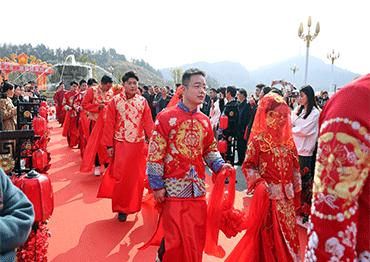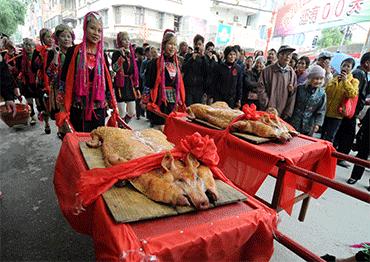Disputes surrounding bride prices are hard to eradicate as long as high marriage payment remains a trend in many places despite a new top court ruling, say experts

A group wedding is held for young couples who have forgone the tradition, Fuzhou, Jiangxi Province, Febrary 20, 2024 (Photo by VCG)
Zhou Na, a 22-year-old mother-to-be from Guizhou Province, is thinking about leaving her fiancé. They met online and got engaged a year later. When the bride price – a sum of money given by the groom’s side in the form of cash, property or gifts – was being negotiated, Zhou took into account that her fiancé, whom she did not name, had spent a lot buying an apartment. She only asked for 68,000 yuan (US$9,400), lower than the local standard which could be as much as double, and three items of gold jewelry, not five.
Zhou suspects he is cheating. But leaving is not an easy decision, as she is pregnant. Her fiancé threatens that she must “return all the money and jewelry” if they break up. She worries the gifts and money she received are not protected by law since the couple had not made their marriage official by registering at the civil affairs bureau.
In tandem with the rise in the value of betrothal gifts, when couples separate, disputes over who gets to keep the cash or items have risen too, some ending up in contentious legal battles.
Zhou’s lawyer had told her that according to an interpretation of the Civil Code issued by China’s top court, the Supreme People’s Court (SPC), when there is a dispute over a bride price, the court will support the return of it if the couple had not registered their marriage, if they had registered but not lived together, or the bride price had caused financial difficulties for the giver.
Zhou feels this is unfair. The relationship was troubled, she had suffered domestic abuse and her partner had cheated. “I didn’t destroy the relationship. Why should I return the money?” she said.
It came as some relief to Zhou that the SPC released a new judicial interpretation on January 18 on managing such disputes. It could mean she gets to keep part, or all of the money.
Taking effect on February 1, the rules state that the length of time a couple has lived together should be a determining factor in whether a bride price is returned, in addition to other factors, including the amount, how it was used, whether they have children, and fault on both sides, including abusive situations. In some cases, local traditions can be taken into account.
‘Beginning of Bankruptcy’
Disputes over the return of the bride price arise when a couple fails to marry or the marriage is too short. Liu Shengfei, a lawyer from Fangzeli Law Firm based in Guangzhou, Guangdong Province, said the majority of disputes come from the man’s side. In some rural areas it is still seen as a purchase of the bride’s labor and fertility. The men’s families demand a refund if things do not go as expected.
Zhang Qian, 24, comes from eastern Henan Province, and he is about to get engaged. He is in no doubt about the terms of paying a bride price. “It’s for getting a wife. If one fails to marry or the marriage ends too soon, the bride needs to return the money,” he told NewsChina.
Zhang described the engagement as “the beginning of family bankruptcy.” He said he needs to hand over 168,000 yuan (US$23,244) in cash, gold jewelry worth 40,000 yuan (US$5,534) and other gifts that will cost him 15,000 yuan (US$2,075). He needs even more money to pay for the wedding banquet and for an apartment.
His parents, whose life goal is to marry him off, started saving as soon as he was born, though their income from farming and odd jobs makes them about 50,000 yuan (US$6,918) a year. Zhang started earning at 20. It would have taken him years to save up himself, he said.
Zhang Jing, a divorce lawyer, told NewsChina that the SPC’s interpretation mentions the financial difficulties of the giver of premarital gifts. It is commonly understood that if someone borrows money to pay the bride price, exhausts all their resources on a marriage that ends prematurely or fails to meet their expectations of starting a family, the money should be returned.
He noted there were fewer disputes in years when the payment was lower.
Though a long tradition in China, bride prices are increasingly unaffordable, particularly in rural areas with a large gender imbalance. Men in these areas have a lower social status and are less well off. They need to pay more to prove their economic strength, which means a guarantee for the bride’s future. A man may be on the hook for anything from 200,000 to 500,000 yuan (around US$27,000-US$69,000), 10 or 20 times a rural household’s annual disposable income.
Liu Shengfei said that disputes are more likely in regions with high bride prices. In Guangxi Zhuang Autonomous Region in Southwest China, bride prices might be as low as 10,000 to 30,000 yuan (around US$1,400-US$4,100), so such lawsuits are few. But in northern China where some families become debt-ridden to pay for a son’s marriage, disputes are more common.
By January 29, there were 176,989 cases involving bride prices listed on the SPC platform. Henan, Anhui, Hebei, Gansu and Shandong provinces in central and northern China had the most cases.
The problem is more acute in rural areas. In developed cities, where there is more gender equality, the bride price is more symbolic, said Zhang Jing. Money given is used by the couple to provide for their lives, so resolving disputes is easier. In rural areas, the bride’s parents often take the money as a “reward” for raising a girl. This complicates issues over repaying money if the relationship breaks down.
Weighted Rulings
Court rulings are often weighted in favor of the man, said lawyers Liu Shengfei and Zhang Jing. If the marriage does not take place, the groom may claim the money was not a bride price, but a form of extortion. He might claim the bride was unfaithful or had left him and refused to return. If he submits proof of payment, courts are likely to rule favorably on those claims, using an SPC judicial interpretation that was issued in 2004 as guidance.
Women have to prove much more, including evidence of cohabitation, pregnancy or miscarriage, as well as proof the bride price was used for shared living expenses. If the woman has evidence of shared use, the judge will make appropriate deductions. However, “it is difficult to prove because women often don’t know they should keep such evidence,” which often leaves them in a helpless situation, Liu said.
Since 2004, the judge’s main job is to determine the nature of the financial transactions, Zhang Jing noted. A judge who deals with these cases in Jiangsu Province told NewsChina that it is much more difficult to distinguish general gifts from bride prices as payment methods have changed. It is hard to tell whether big transactions through payment platforms are for marriage-oriented bride prices or gifts as gestures of love.
Gao Jihong, a lawyer from Beijingbased Jiali Law Firm, acted in a case in which a man gave his fiancée 1 million yuan (around US$138,500). She left him months later after he cheated. The man sued for all the money, claiming financial difficulties due to a traffic accident. The woman provided evidence of the man’s misconduct, and said the money was used to renovate the house and pay for the wedding and honeymoon. The man denied the money was for common use, except for a diamond ring.
In the ruling, the judge decided that due to the man’s disability, he would encounter financial difficulties, and ordered the woman to return 300,000 yuan (US$41,500).
Liu said that if a gift is “sufficiently big,” it may be considered as a bride price and could be returned. The threshold for a “sufficiently big” amount is generally 10,000 yuan (around US$1,400) in southern regions, while in central China, the standard is much lower, perhaps 500 yuan (US$69).
In reality, there are a lot of significant financial transactions in non-marital relationships. But in judicial practice, big financial transactions are seen as bride prices by default, which is not in line with current dating patterns, Liu said.
Ran Keping, a law professor from Wuhan University, noted that the previous judicial interpretation ignores factors such as the fault of either party, length of cohabitation and the actual use of bride prices. This reflects lawmakers’ sympathy for the giver of bride prices, but obviously lacks rationality, Ran said.

A groom’s wedding procession take gifts to the bride���s home, Shangsi, Guangxi Zhuang Autonomous Region, October 27, 2012 (Photo by VCG)
More Equality
The new regulation takes these situations into consideration.
It excludes three kinds of spending from being considered as a bride price: small gifts or cash given on special occasions or birthdays, daily consumption expenditure or other small valuables. It also accounts for the changes in the nature of modern relationships, where couples are more likely to live together, sometimes for years, before they get married.
Many lawyers and judges believe the regulations are more detailed and specific, pointing to a direction the female party can work toward in her defense, and guiding lawyers to prepare evidence more effectively in litigation. For judges, the rules are clearer.
But lawyer Gao Jihong noted that even though the regulations differentiate bride prices and general gifts, the amounts of bride prices and the clarity of the time and manner of payment should be more defined in the law.
Several interviewed lawyers believe judges still have too much discretion, and might issue contradictory rulings given local economic development and differences in their personal understanding, Liu Shengfei noted.
Liu cited a case in Guangzhou where a wealthy man gave gifts worth over 3 million yuan (US$415,000) to a woman. When the two separated and the man sued, the judge believed the money was a drop in the ocean for a rich man and therefore not a bride price.
But neither the judicial interpretation nor the new regulations are expected to solve disputes. Liu Shengfei noted that with soaring bride pries, the old custom has become more a matter of financial interest, not love. These disputes are hard to resolve solely through the introduction or updating of judicial interpretations, Liu said.
Some areas have tried to prevent high bride prices, issuing rules around maximum amounts that can be given.
In 2020, the Ministry of Civil Affairs issued guidance on marriage customs reform, including curbing high bride prices, and listed 32 places for the reform, involving 22 provinces and cities. Some places set a cap on bride prices of around 50,000 yuan (US$7,000) while some hold group weddings for couples who abandon the tradition. Communist Party members are encouraged to lead by example and eschew the custom altogether.
But Ran Keping stressed that the bride price has existed for thousands of years. Legislation can only regulate it on the condition of respecting it. As long as the social foundation for high bride prices exists, attempts to regulate it will have limited effectiveness.
Zhang Qian said there are over 40 unmarried men in his village, mainly due to lack of money. “There are few girls. If you don’t pay enough, who’d want to marry you?”

 Old Version
Old Version

